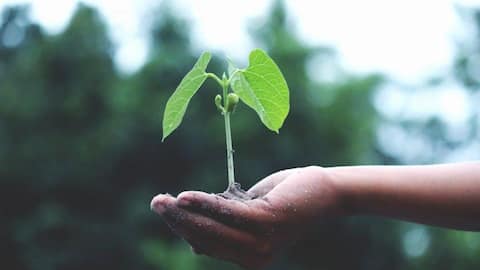Eco-friendly hacks for a better, sustainable lifestyle
What's the story
As the world faces increasing environmental challenges, incorporating eco-friendly habits into our daily lives has never been more crucial. Adopting a sustainable lifestyle can significantly reduce our carbon footprint, conserve resources, and promote overall well-being. Let's explore some practical eco-friendly hacks to help you live a greener, more sustainable life.
Reduce waste
Reduce, Reuse, Recycle
Adopting "Reduce, Reuse, Recycle" is key to a sustainable lifestyle. Reduce waste by choosing minimally packaged products and avoiding single-use plastics. Reuse items by repurposing glass jars for storage, converting old clothes into rags, or donating unneeded items. Sort recyclables to ensure effective recycling. Recycling conserves resources and reduces greenhouse gas emissions by decreasing the demand for new raw materials, promoting environmental sustainability.
Informed choice
Choose eco-friendly products
Enhance sustainability by making informed choices. Opt for local and organic foods to reduce resource use. Choose eco-friendly cleaning products that are biodegradable and non-toxic to minimize indoor pollution and environmental harm. Support fashion brands with sustainable practices and ethical labor conditions, and select clothing made from organic or recycled materials. These decisions promote a healthier planet and a more ethical economy.
Whole foods
Opt for conscious snacking
Opt for conscious snacking by choosing whole, minimally processed foods. Fresh fruits, nuts, seeds, and vegetables are excellent options that provide essential nutrients without excessive packaging. Make your own snacks, like homemade granola bars or roasted chickpeas, to avoid added sugars and preservatives. This mindful approach to snacking supports both personal health and environmental sustainability.
Kitchen garden
Grow your own food
Starting a small garden on your balcony or windowsill provides fresh, organic produce and reduces reliance on store-bought goods. Growing your own food lowers the environmental costs of transportation and packaging. Composting kitchen scraps creates nutrient-rich soil, enriching your garden and reducing household waste. Gardening is rewarding and therapeutic, fostering a connection to nature and a deeper appreciation for the food you consume.
Sustainable food
Adopt a plant-based diet
Incorporating more plant-based foods into your diet can significantly reduce your environmental impact. The production of animal-based foods requires significantly more resources, such as water and land, and generates higher greenhouse gas emissions compared to plant-based foods. Plant-based diets also offer health benefits, including lower risks of chronic diseases. Small changes, like adopting a plant-based day weekly, can make a big difference.
